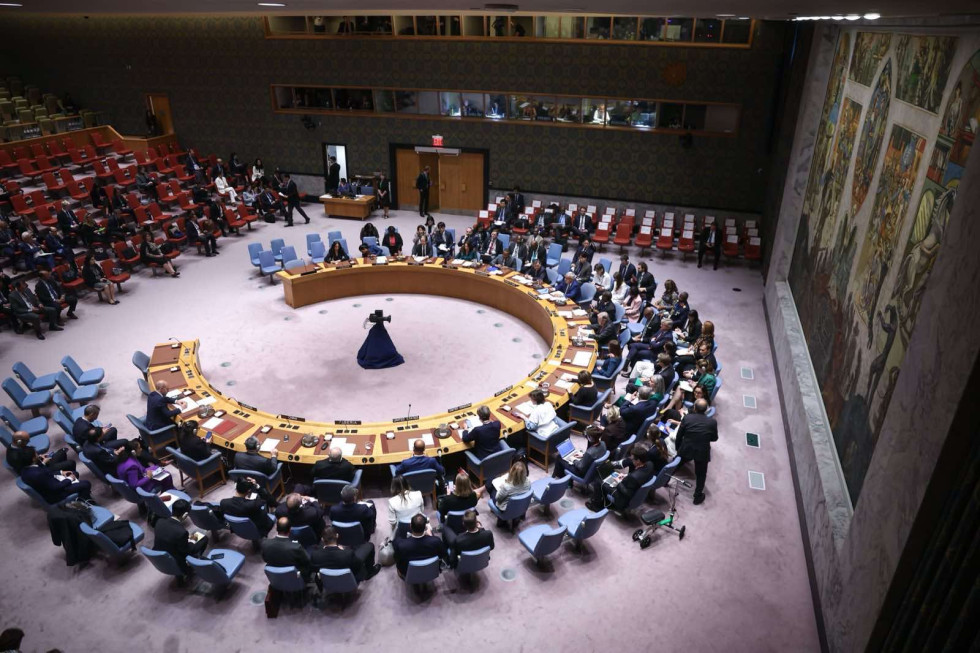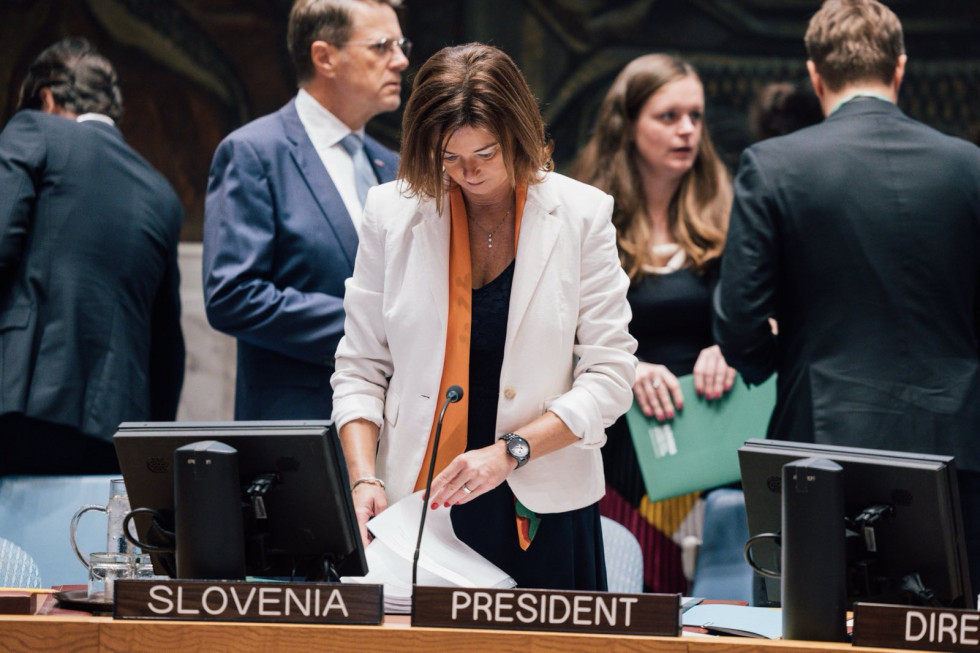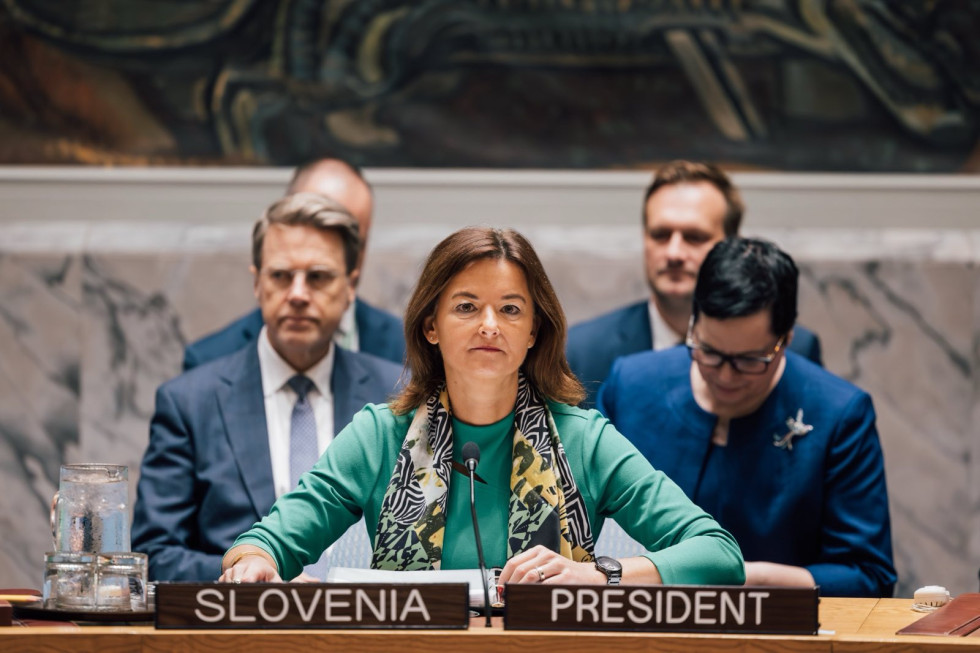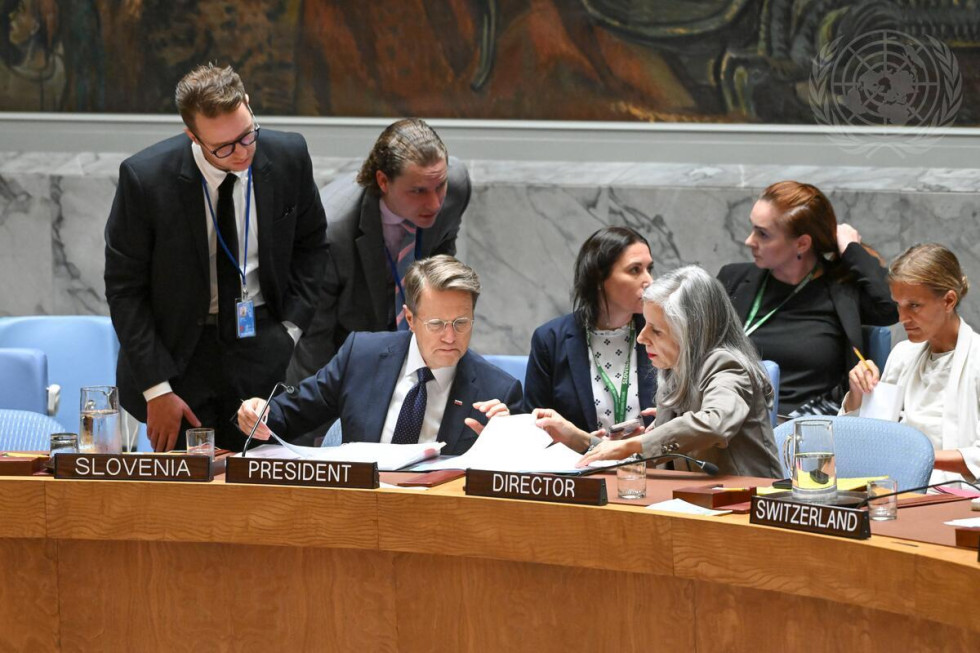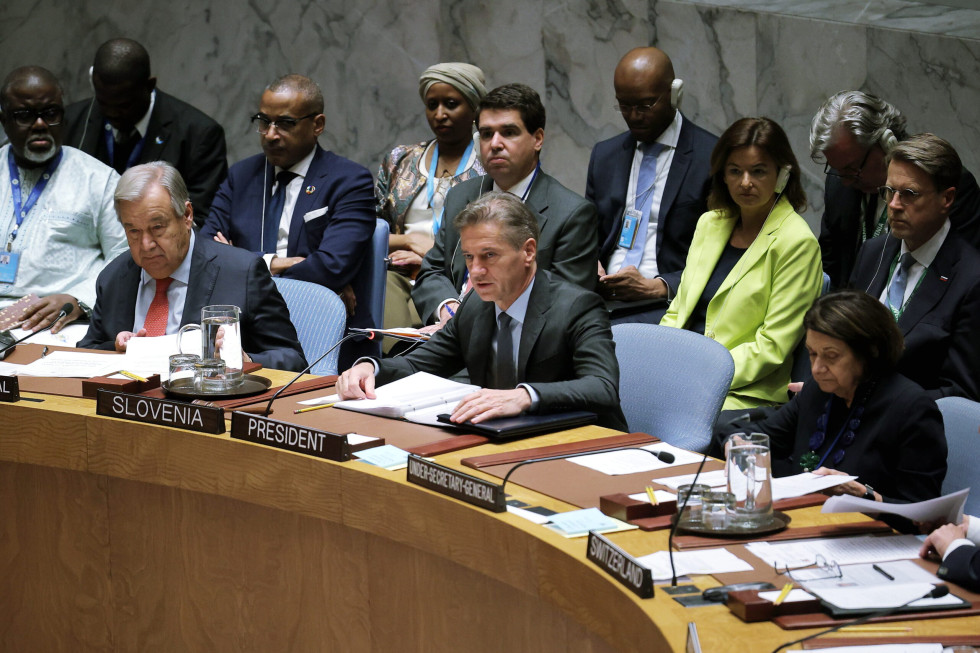First half of UN Security Council membership: Slovenia is a principled, responsible and respected member
A year ago, Slovenia joined the Security Council at an extremely challenging time, three months into the conflict in the Middle East, which further divided the international community and the main body responsible for maintaining international peace and security. Over the past year, the UNSC has been unable to find adequate solutions and stop the suffering of civilians not only in Gaza, but also in Sudan, Ukraine, Yemen, Myanmar and Haiti. Two permanent members of the Security Council have repeatedly used their veto to prevent urgent action. Particularly concerning are the poor implementation of the Council’s decisions, violations of UN and international law, and continued Russian aggression against Ukraine. These circumstances have significantly weakened the UNSC ability to maintain international peace and security.
As a member of the group of ten elected members of the Security Council, Slovenia has actively contributed to the attempts to end the war in Gaza and strengthened its connecting role within the group. Security Council Resolution 2728, co-sponsored with other non-permanent members in March, was the first UNSC resolution to call for an immediate ceasefire in the Gaza Strip. It also called for the release of hostages and an unimpeded delivery of humanitarian aid.
The second draft resolution on Gaza voted on by the Security Council in November followed a call by Slovenian Prime Minister Robert Golob during Slovenia’s presidency of the UNSC in September. In light of the dire situation on the ground, PM Golob urged members to adopt a “new humanitarian resolution on Palestine” at an emergency meeting on Gaza. The resolution also called for an immediate, unconditional and permanent ceasefire in Gaza, unimpeded delivery of large-scale humanitarian aid and the unconditional release of all hostages. It was co-sponsored by 14 Security Council members, but was blocked by a US veto.
In July, an initiative to support the UN Relief and Works Agency for Palestine Refugees in the Near East (UNRWA) was launched at the initiative of Slovenia, Jordan and Kuwait. The 123 UN member states that joined the initiative reaffirmed that UNRWA is irreplaceable as a pillar of survival for millions of Palestinian refugees and that it must be adequately funded. In 2024, Slovenia has significantly increased its contribution to the Agency.
“We can be proud of Slovenia’s stance and role in the Security Council. The professionalism and competence of our diplomacy have ensured the visibility of Slovenian positions, including in the global media. Slovenia has proved to be a respected and credible partner that treats all crisis hotspots equally. It played a key role in the attempts to achieve a ceasefire in Gaza and acted as liaison within the group of elected members, which tabled two resolutions on Gaza in the context of disagreements among the permanent members. Slovenia also used its role as the presiding member to negotiate the adoption of the Presidential Statement on Leadership for Peace, which is now an official document of the Security Council, despite deep divisions within the Council. Slovenia will face the challenges of the coming year with the same vigour, responsibility and focus on the most vulnerable,” said Tanja Fajon, Deputy Prime Minister and Minister of Foreign and European Affairs, after the first 12 months of Slovenia’s membership of the Security Council.
“The Security Council has as much power as the member states are willing to give it. During the past year, its hands have often been tied. Instead of extinguishing hotspots, new ones are opening up and the civilian death toll is at an all-time high. Nevertheless, Slovenia is making heroic efforts to maintain an ongoing dialogue and to continue to search for common solutions. Despite the stalemate, common ground can be found, as confirmed by the Presidential Statement adopted by the Council in September. 2025 will be about finding consensus among members, tearing down walls and building bridges,” said Ambassador Samuel Žbogar, Slovenia’s representative to the Security Council.
Slovenia’s first year on the UN Security Council
During its one-month presidency in September, Slovenia organised four high-level meetings, including the presidency’s main event – the open debate on leadership for peace. As presiding member, it issued two press releases on behalf of all members, condemning the terrorist attacks in Afghanistan and Mali, and prepared two group statements – on women, peace and security, and on climate, peace and security.
In 2024, it has called for at least 15 meetings of the Security Council, notably on Ukraine and Gaza. It has also convened two informal, Arria-formula meetings of the Security Council – on environmental challenges and peace, and on persons with disabilities in armed conflict. It has used the first half of its term to act as liaison and build trust, collaborating closely with the other elected members of the Council.
Strong support for Ukraine in the Security Council
As the penholder of the political dossier on Ukraine, Slovenia ensured that the Council kept the issue on the agenda throughout the year. Members discussed Russian attacks on nuclear and energy facilities, the security situation in Ukraine, humanitarian aid, the killing of civilians, children and other pressing issues. Regrettably, the Russian veto made it impossible for the Security Council to adopt any decisions on this issue.
Expectations for 2025
Slovenia regularly refers to its political priorities in the work of the Security Council, including the role of women and girls in conflict, mainstreaming climate change and conflict and water diplomacy. Achieving peace and security, ending civilian suffering and ensuring accountability for the worst violations of international law are also high on its agenda.
Slovenia will continue to pursue its SC membership priorities also in 2025. It will continue to call for peace in the Middle East and actively address the situations in Sudan and Ukraine. A field visit of the Security Council to at least one of these conflict areas would be highly desirable. Slovenia will also be paying special attention to the situation in the Western Balkans.
Our country enters the second half of its SC membership with a new group of five elected members: Ecuador, Japan, Malta, Mozambique and Switzerland will be replaced by Denmark, Greece, Pakistan, Panama and Somalia.


